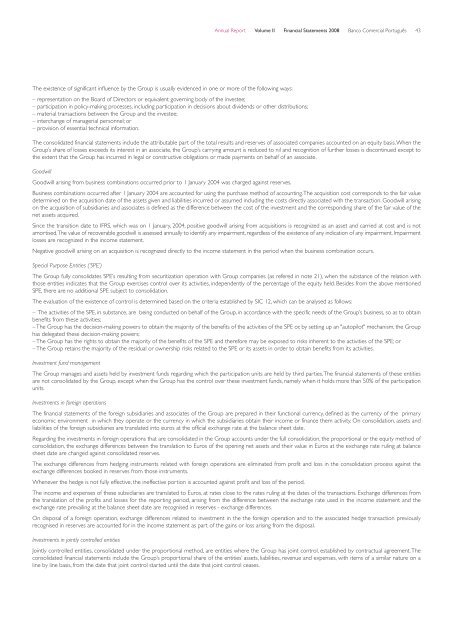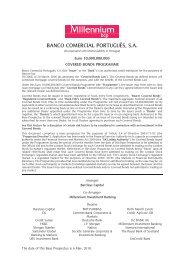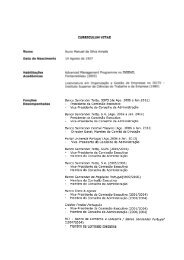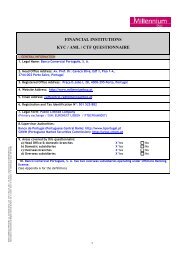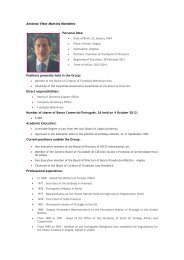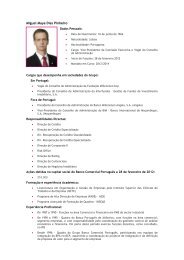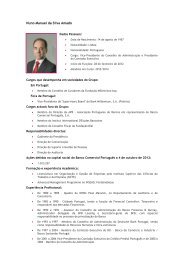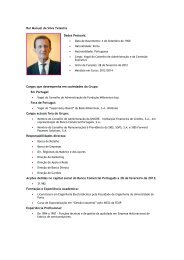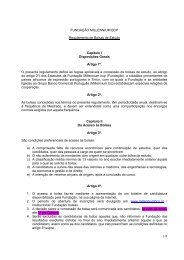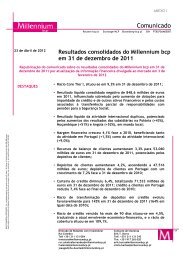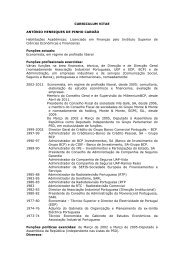09-041334 Relatorio INGLES Vol 2 - BCP KOMORI 4 - Millennium bcp
09-041334 Relatorio INGLES Vol 2 - BCP KOMORI 4 - Millennium bcp
09-041334 Relatorio INGLES Vol 2 - BCP KOMORI 4 - Millennium bcp
Create successful ePaper yourself
Turn your PDF publications into a flip-book with our unique Google optimized e-Paper software.
Annual Report <strong>Vol</strong>ume II Financial Statements 2008 Banco Comercial Português 43<br />
The existence of significant influence by the Group is usually evidenced in one or more of the following ways:<br />
– representation on the Board of Directors or equivalent governing body of the investee;<br />
– participation in policy-making processes, including participation in decisions about dividends or other distributions;<br />
– material transactions between the Group and the investee;<br />
– interchange of managerial personnel; or<br />
– provision of essential technical information.<br />
The consolidated financial statements include the attributable part of the total results and reserves of associated companies accounted on an equity basis. When the<br />
Group’s share of losses exceeds its interest in an associate, the Group’s carrying amount is reduced to nil and recognition of further losses is discontinued except to<br />
the extent that the Group has incurred in legal or constructive obligations or made payments on behalf of an associate.<br />
Goodwill<br />
Goodwill arising from business combinations occurred prior to 1 January 2004 was charged against reserves.<br />
Business combinations occurred after 1 January 2004 are accounted for using the purchase method of accounting. The acquisition cost corresponds to the fair value<br />
determined on the acquisition date of the assets given and liabilities incurred or assumed including the costs directly associated with the transaction. Goodwill arising<br />
on the acquisition of subsidiaries and associates is defined as the difference between the cost of the investment and the corresponding share of the fair value of the<br />
net assets acquired.<br />
Since the transition date to IFRS, which was on 1 January, 2004, positive goodwill arising from acquisitions is recognized as an asset and carried at cost and is not<br />
amortised. The value of recoverable goodwill is assessed annually to identify any impairment, regardless of the existence of any indication of any impairment. Impairment<br />
losses are recognized in the income statement.<br />
Negative goodwill arising on an acquisition is recognized directly to the income statement in the period when the business combination occurs.<br />
Special Purpose Entities (‘SPE’)<br />
The Group fully consolidates SPE’s resulting from securitization operation with Group companies (as refered in note 21), when the substance of the relation with<br />
those entities indicates that the Group exercises control over its activities, independently of the percentage of the equity held. Besides from the above mentioned<br />
SPE, there are no additional SPE subject to consolidation.<br />
The evaluation of the existence of control is determined based on the criteria established by SIC 12, which can be analysed as follows:<br />
– The activities of the SPE, in substance, are being conducted on behalf of the Group, in accordance with the specific needs of the Group’s business, so as to obtain<br />
benefits from these activities;<br />
– The Group has the decision-making powers to obtain the majority of the benefits of the activities of the SPE or, by setting up an "autopilot" mechanism, the Group<br />
has delegated these decision-making powers;<br />
– The Group has the rights to obtain the majority of the benefits of the SPE and therefore may be exposed to risks inherent to the activities of the SPE; or<br />
– The Group retains the majority of the residual or ownership risks related to the SPE or its assets in order to obtain benefits from its activities.<br />
Investment fund management<br />
The Group manages and assets held by investment funds regarding which the participation units are held by third parties. The financial statements of these entities<br />
are not consolidated by the Group, except when the Group has the control over these investment funds, namely when it holds more than 50% of the participation<br />
units.<br />
Investments in foreign operations<br />
The financial statements of the foreign subsidiaries and associates of the Group are prepared in their functional currency, defined as the currency of the primary<br />
economic environment in which they operate or the currency in which the subsidiaries obtain their income or finance them activity. On consolidation, assets and<br />
liabilities of the foreign subsidiaries are translated into euros at the official exchange rate at the balance sheet date.<br />
Regarding the investments in foreign operations that are consolidated in the Group accounts under the full consolidation, the proportional or the equity method of<br />
consolidation, the exchange differences between the translation to Euros of the opening net assets and their value in Euros at the exchange rate ruling at balance<br />
sheet date are changed against consolidated reserves.<br />
The exchange differences from hedging instruments related with foreign operations are eliminated from profit and loss in the consolidation process against the<br />
exchange differences booked in reserves from those instruments.<br />
Whenever the hedge is not fully effective, the ineffective portion is accounted against profit and loss of the period.<br />
The income and expenses of these subsidiaries are translated to Euros, at rates close to the rates ruling at the dates of the transactions. Exchange differences from<br />
the translation of the profits and losses for the reporting period, arising from the difference between the exchange rate used in the income statement and the<br />
exchange rate prevailing at the balance sheet date are recognised in reserves - exchange differences.<br />
On disposal of a foreign operation, exchange differences related to investment in the the foreign operation and to the associated hedge transaction previously<br />
recognised in reserves are accounted for in the income statement as part of the gains or loss arising from the disposal.<br />
Investments in jointly controlled entities<br />
Jointly controlled entities, consolidated under the proportional method, are entities where the Group has joint control, established by contractual agreement. The<br />
consolidated financial statements include the Group’s proportional share of the entities’ assets, liabilities, revenue and expenses, with items of a similar nature on a<br />
line by line basis, from the date that joint control started until the date that joint control ceases.


